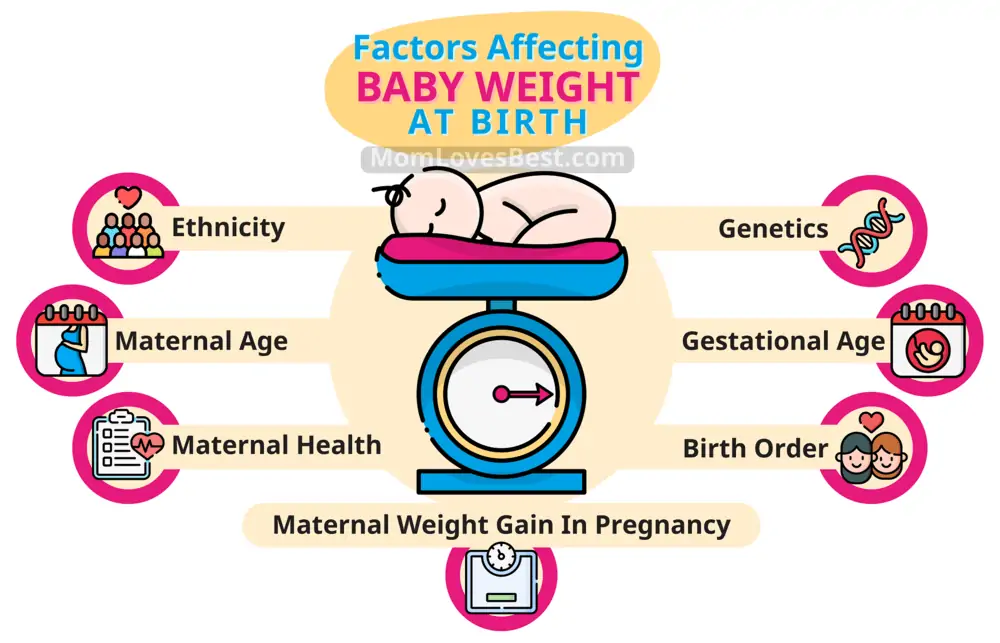It’s easy to obsess over a baby’s weight. Parents want to make sure their baby is “normal” and healthy. Weight measurements in pounds and ounces are straightforward to obtain, shareable, simple to understand, and something to which we can all relate.
However, average baby weight is also a cause of worry. I have never met anyone who hasn’t worried about their baby’s weight at some point. So, let’s take a look at what counts as average birth weight, how and when a baby’s weight changes, and how percentiles work.
How Much Does The Average Newborn Weigh In The U.S.?
The average baby in the U.S. weighs around 7.5 pounds at birth. However, anything between 5.5 pounds and 10 pounds is considered normal. Other factors are more important than a baby’s weight alone, such as how much they weigh in proportion to their length and their gestational age.
- What Is the Average Baby Weight at Birth?
- How Big of a Baby Can You Deliver?
- Factors Affecting Average Baby Weight at Birth
- Are Boy Babies Bigger Than Girls?
- Average Baby Weight By Month
- How to Track Average Baby Weight
- Why Is My Baby Not Gaining Weight?
- What If My Baby Weighs More Than Average?
- Weighing Up Your Baby’s Pounds
What Is the Average Baby Weight at Birth?
The average newborn weight at birth in the U.S. is around 7.5 pounds. Any birth weight between 5.5 pounds and 10 pounds is seen as normal (1). This healthy average weight range applies to babies born between 37 weeks to 40 weeks and 6 days.
How Big of a Baby Can You Deliver?
A baby with a birth weight over 8 pounds and 13 ounces is considered large. About 9 percent of babies fall into this range (2). Risks to both baby and mother increase significantly when birth weight is over 9 pounds and 15 ounces.
However, how big of a baby you can deliver doesn’t just depend on the weight of your baby. It also depends on:
- The position of your baby during labor.
- The strength of your uterine contractions.
- How big your baby is in relation to the size and shape of your pelvis (3).
A woman with a larger, wider pelvis may be able to vaginally deliver a larger baby than a woman with a smaller, narrower pelvis. Only a medical professional can advise whether your baby’s size might cause problems during vaginal delivery.
Factors Affecting Average Baby Weight at Birth
A baby’s birth weight is the result of a complex combination of factors (4). To further complicate things, there are no hard and fast rules about how, or if, any of these factors will affect your baby.
Ethnicity
In the U.S., babies born to black parents are significantly more likely to have a low birth weight than babies of other ethnicities (5). Black women are three times likelier to have a baby that classifies as having low birth weight (6).
However, it is unclear how much of this difference is down to genetics and how much is a result of the higher poverty rate and associated health issues suffered by some black Americans.
Babies born to parents of all other ethnicities have roughly equal rates of low, average, and high birth weights.
Maternal Age
The youngest mothers, those under the age of 20, are more likely to have babies that weigh less than average. Between the ages of 20 and 35, mothers are most likely to have an average weight baby.
Mothers over 35 tend to have babies that are smaller or larger than average. Approximately 10 percent of mothers over 40 have a large baby, compared to 3 percent of the youngest moms (7).
Maternal Health
A mother’s pre-existing health conditions, as well as her health during pregnancy, can affect her child’s birth weight.
- If a mother has diabetes before becoming pregnant or if she develops gestational diabetes, she is more likely to have a bigger baby.
- Mothers who have high blood pressure before pregnancy or develop pregnancy-induced hypertension or preeclampsia are more likely to have smaller babies.
- A mother who experiences a lack of healthy nutrition during pregnancy is more likely to have a baby who is smaller or larger than average.
- Smoking tobacco or marijuana during pregnancy is associated with low birth weight (8). So, too, is excessive alcohol consumption (9).
Maternal Weight Gain In Pregnancy
How much weight a mother gains during pregnancy, in relation to her starting weight, impacts her child’s birth weight.
On average:
- Women who put on less than the appropriate amount for their pre-pregnancy weight are more likely to have a smaller-than-average baby.
- Women who put on more than the appropriate amount for their pre-pregnancy weight are more likely to have a larger-than-average baby.
Genetics
The birth weight and length of a biological mother and father influence the birth weight of their baby (10). The genetic makeup of mother and baby, and how their respective genetics affect how their bodies interact in the womb also have an impact (11).
Gestational Age
The sooner a baby is born, the less it is likely to weigh more than average. Not surprisingly, babies born before 37 weeks are more likely to weigh less than average. Those born after 40 weeks and 6 days are likely to weigh more than average.
Birth Order
As a rough guide, each baby a mother has with the same biological father will typically be heavier than the last.
However, this is not set in stone — I am proof of that. My second child was born at 40 weeks and weighed 11 pounds and 9 ½ ounces, the heaviest of my five babies. Meanwhile, my fourth child was born at 39 weeks and weighed 4 pounds and 4 ounces, the lightest of the five.
Are Boy Babies Bigger Than Girls?
All other things being equal, baby boys tend to weigh slightly more than baby girls. Some sources pinpoint the extra weight at just a few ounces, so it’s not a huge difference.
Average Baby Weight By Month
This table shows the average weight of a healthy baby who was born after 37 weeks.
| Age | Boys | Girls |
|---|---|---|
| 1 Month | 9 lbs 14 oz (4.5 kg) | 9 lbs 4 oz (4.2 kg) |
| 2 Months | 12 lbs 5 oz (5.6 kg) | 11 lbs 4 oz (5.1 kg) |
| 3 Months | 14 lbs (6.4 kg) | 12 lbs 14 oz (5.8 kg) |
| 4 Months | 15 lbs 7 oz (7.0 kg) | 14 lbs 2 oz (6.4 kg) |
| 5 Months | 16 lbs 9 oz (7.5 kg) | 15 lbs 3 oz (6.9 kg) |
| 6 Months | 17 lbs 8 oz (7.9 kg) | 16 lbs 2 oz (7.3 kg) |
| 7 Months | 18 lbs 5 oz (8.3 kg) | 16 lbs 14 oz (7.6 kg) |
| 8 Months | 19 lbs (8.6 kg) | 17 lbs 7 oz (7.9 kg) |
| 9 Months | 19 lbs 10 oz (8.9 kg) | 18 lbs 2 oz (8.2 kg) |
| 10 Months | 20 lbs 3 oz (9.2 kg) | 18 lbs 11 oz (8.5 kg) |
| 11 Months | 20 lbs 12 oz (9.4 kg) | 19 lbs 4 oz (8.7 kg) |
| 12 Months | 21 lbs 3 oz (9.6 kg) | 19 lbs 10 oz (8.9 kg) |
Newborn Weight Loss
It is completely normal for a newborn baby to lose a few ounces during their first five days. This happens because babies are born with excess fluid in their system, and they lose that fluid in the days following their birth.
Exactly how much weight this will depend on your child. Losing between 7 percent and 10 percent of their birth weight is considered normal (12). Your baby will regain this weight in the following five days or so.
As long as your baby is feeding and producing wet diapers, the loss of a few ounces is nothing to worry about. However, if you are concerned, contact your doctor for advice.
Baby Growth Spurts
While growth spurts can happen at any age, there are times during the first year when your baby is likely to have them (13). These growth spurts last from a few days to around a week. During a growth spurt, your baby will be hungrier than usual and experience a change in sleep patterns.
Growth spurts are likely to happen at:
- Between 1 and 3 weeks.
- Between 6 and 8 weeks.
- 3 months.
- 6 months.
- 9 months.
How to Track Average Baby Weight
Keeping an eye on your baby’s weight gain or loss is a good thing to do because it can help you spot any potential problems. Here are some easy ways to check weight, as well as some tips for doing it correctly.
- The best way to track your child’s weight is to have them weighed at regular health and development checks. Having the same person weigh your baby on the same equipment makes it easier to compare their weight gains over time. This also allows your healthcare provider to evaluate your baby’s weight in the context of their general health.
- Consider buying a baby scale. It’s the easiest method of weighing your baby.
- If you don’t want to buy a baby scale, carefully step on your bathroom scale while holding your baby and then re-weigh yourself without your baby. Subtract the lower number from the higher number, and that gives you your baby’s weight.
- A person’s weight can fluctuate throughout the day. Instead of weighing your baby daily, do it weekly. That will spare you the worry of any minor daily fluctuations.
- Don’t stress out over any minor changes. Instead, mention them to your doctor and watch for your baby’s overall health. Concentrate on if they seem well, if they’re feeding as usual, and if they have regular wet and poopy diapers.
- Keep in mind that all babies are different. Some may gain weight at a faster rate than others, and that’s okay.
And to stop yourself from going crazy, remember that the exact amount of weight gain that is healthy for your baby depends on their size at birth. That is why medical professionals track baby weight charts that use percentiles.
Understanding Weight Percentiles
A percentile chart monitors your baby’s weight over time. When your baby is born, their birth weight will be represented on the chart by a dot. This dot will be on or near a percentile line.
As your baby gets older, their weight will be plotted onto the same chart. When you join up the dots representing your baby’s weight, they will make a line. The shape of the curve made by this line is more important than how many pounds or ounces your baby gains.
For instance, a baby whose weight is plotted on the 25th percentile at birth is lighter than 75 percent of other babies. As a baby grows, their weight should remain, roughly, at the same percentile. So, at one year, that same baby will still be around the 25th percentile and still be lighter than 75 percentile of other babies.
Likewise, the weight gain of a baby who lands on the 90th percentile at birth should still be somewhere close to the 90th percentile at one year.
When the dots representing weights over time are joined up, the shape they make should be roughly the same for both babies, even though their weights are different.
All medical professionals use the same percentile growth charts.
If a baby has a higher or lower than average weight gain for a few weeks, this is not usually a cause for concern. If your child’s weight gain greatly slows down or speeds up over a longer period of time, this could indicate a health issue.
By plotting a line on a weight chart, it is easy to see if a child is growing at an average speed. If their growth slows or speeds up over a longer period of time, plotting their growth on a chart will give a different shape curve. This allows any medical professional to see, at a glance, whether your baby’s weight gain is healthy for them.
Why Is My Baby Not Gaining Weight?
When a baby is not gaining the weight they should over a longer period, it is referred to as failure to thrive. This is not a disease or a condition in itself. Instead, it is a symptom that a baby is not getting the calories it needs to gain weight (14).
A baby may not gain enough weight if they are not given enough calories. This could be because:
- Their formula is not being mixed correctly.
- There are difficulties with breastfeeding.
- An adult doesn’t recognize a baby’s hunger cues.
- A family cannot afford enough food.
A baby may also not gain enough weight because they are not eating enough. This could be because:
- A medical condition such as a cleft palate prevents them from eating enough.
- There has been a recent move to solids and the baby has become a picky eater.
- A developmental delay prevents them from eating enough.
They also might have weight gain failure because a medical issue prevents them from using calories. This might happen because of:
- Cystic fibrosis, which prevents a person from absorbing any calories from food.
- Food intolerances such as wheat or dairy.
- Diabetes and other metabolic disorders that allows them to absorb nutrients but stops the body from using them effectively.
What To Do If Your Baby Is Not Gaining Weight
There are practical steps you can take if your baby is not gaining weight.
- The first and most important thing to do is talk with your doctor. They will help you decide whether your child’s weight is something that can be monitored or whether further investigation is needed.
- Attend all of your child’s scheduled developmental checks. This will ensure your baby’s weight is monitored over the long-term.
- If your baby is six months or younger, decrease the amount of solid food you are giving them. Solid food has fewer calories than the same volume of milk. A baby who fills up on solid food will not have enough room for the milk they need.
- For younger babies, do not try to feed to a schedule, instead feed your baby whenever they seem hungry.
- If your baby is older than six months, offer healthy foods with a higher calorie count. Bananas, for instance, have more calories per ounce than apples.
- Ensure your child has a healthy snack mid-morning and mid-afternoon.
What If My Baby Weighs More Than Average?
There is nothing inherently wrong with a baby who weighs more than average. It may be that they are longer than average and their weight is in proportion to their length.
This was the case with my oldest son. Although he weighed over 11 pounds at birth, which is way past the 97th percentile, he was also 24 inches long. That length is even further past the 97th percentile, so he was a little underweight for his length.
He grew at an average rate and remains exceptionally large for his age but in proportion.
There are three main reasons why a baby might begin to gain more weight than is healthy for them:
- Too many calories: This could be because they are offered foods that are high in unhealthy fats and sugars, or because their formula is mixed incorrectly.
- Too much food: Even a baby who is offered healthy foods can gain excess weight if they eat more often than they need to, or have too many snacks.
- Medical conditions: Conditions such as hypothyroidism can cause babies to gain excess weight gain, although they typically present with other symptoms such as constipation, poor feeding, and loud breathing (15).
What To Do If Your Baby Is Gaining Too Much Weight
There are practical steps you can take if your baby is gaining too much weight.
Word Of Caution
- First, speak with your doctor. Your doctor will be able to tell you if your baby’s weight is moving at a healthy rate.
- Check that you are mixing your baby’s formula correctly. Even a little extra powder in the water can lead to excess weight gain if it happens at every meal.
- If you are feeding solids, ensure you are offering healthier foods.
- Do not offer too many snacks between meals.
- Don’t overload your baby with milk and food at night, hoping they’ll sleep for a longer stretch. This may result in them overeating and feeling that sensation is normal.
Weighing Up Your Baby’s Pounds
Healthy babies come in all shapes and sizes. Your child’s weight is only one of many indicators of their health.
I won’t tell you not to worry about your baby’s weight. I know from experience that’s impossible. Instead, I will advise you to try not to obsess over this one number and view your baby’s weight in the context of their general health.
Most importantly, if you have any concerns, speak with your doctor or another healthcare professional. They are in a position to knowledgeably discuss your child’s weight and advise you whether it is something to worry about.







